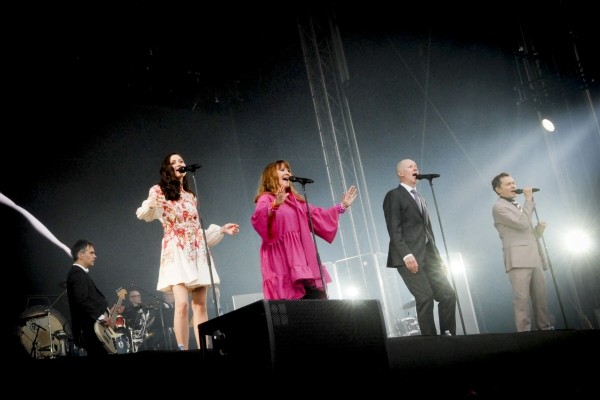Ultra Bra, one of the most beloved Finnish bands of the 1990s, has released new songs after more than two decades and reunited for shows at Helsinki’s Olympic Stadium and summer festivals.
The same July weekend as Britpop legends Oasis played their first reunion shows, another mega-successful 90s band made a live comeback after a long hiatus – but one that’s little-known outside of Finland.
Marking its 30th anniversary, Ultra Bra headlined Ruisrock in Turku, one of Europe’s oldest rock festivals. They took the stage with about two dozen people, including large string and horn sections.
“You haven’t changed a bit; you look great,” quipped Arto Talme, one of Ultra Bra’s four vocalists. They led the audience in nostalgic singalongs – and premiered a new song, “Aarre” (“Treasure”), released nearly a quarter-century after the group’s phenomenal six-year run ended in 2001.
“When we went into the studio, none of us really knew what to expect. Even after all these years, the band started playing together in a way that felt special – something that we wouldn’t want to lose just yet,” said vocalist Terhi Kokkonen when it was released.
Ultra Bra became one of the biggest bands of the 90s in Finland, which was a surprise since their sound is far from Britpop, grunge or electronica. Instead it’s cinematic, retro pop with soaring vocal harmonies. Pianist-composer Kerkko Koskinen’s catchy melodies and lush arrangements of horns and strings bring to mind old James Bond, Henry Mancini and Quincy Jones LPs.
Beginning in 1996, the group scooped up nine Emma (Finnish Grammy) awards, including an unbroken four-year streak as Group of the Year. Three albums went to number one, and four reached platinum sales.
Songs about breakups – and wind power

Vocalists Terhi Kokkonen, Vuokko Hovatta, Arto Talme and Olli Virtaperko at Turku’s Ruisrock Festival in July 2025.Photo: Sinimaaria Kangas
The band was started as a lark by university students, many of them from well-known cultural families. The set-up was inspired by 1970s Finnish leftist bands like Agit Prop, which similarly had two female and two male singers. Yet while UB’s songs commented on politics and current affairs, they did so with a smirk.
“I don’t think we ever did agitation or propaganda as such. Rather, we used the musical language and passion of the old political movement to sing about our own lives,” says the band’s guitarist and graphic designer, Joel Melasniemi.
Most of their hits focus wryly on interpersonal relationships. The two biggest, “Minä suojelen sinua kaikelta” (“I Will Protect You From Everything”) and “Sinä lähdit pois” (“You Went Away”) appeared on their bestselling second album: Kroketti (“Croquet”) in 1997.
The first has become a sort of anthem for young climate activists, while the latter song sketches a breakup, the narrator watching her lover leaving after an all-night party and quipping laconically: “the last drink of the night/turns into breakfast/I added coffee to it”.
Like most Ultra Bra lyrics, these are by Anni Sinnemäki, who was once married to Koskinen. She went on to publish two books of poetry, become leader of the Green Party, a cabinet minister and now deputy mayor of Helsinki.
In “Kahdeksanvuotiaana” (“At the Age of 8”), she recalls growing up with the dread of nuclear war. And in the chorus of “Ilmiöitä” (“Phenomena”) – written in 1999 when she was an MP – she wondered why there was “still no wind power”. Thankfully, now there is, and it’s Finland’s second-largest (“In a Blind Moment”), one of Koskinen’s loveliest melodies, starring jazz saxophonist Linda Fredriksson, who played a fierce baritone solo at Ruisrock.
Another vocalist, Olli Virtaperko, now a contemporary classical composer, recalls that Koskinen was already a promising bandleader in the early ‘90s.
“The core group of Ultra Bra attended Kallio Upper Secondary School of Performing Arts in Helsinki. We all used to get together at Kerkko’s house, where he led us in playing and singing all kinds of music, from jazz standards to pop classics,” he says.
A few years later, when they had all gone on to university, Virtaperko suggested to Koskinen that they get the old gang back together to record an entry for a political song contest, which they won with a semi-serious anti-EU song. The lyrics were by Juhana Rossi, now editor of a Finnish business daily and reporter for The Wall Street Journal. Finland had just joined the EU, which rankled leftist university circles.
“The prize for the competition was the opportunity to record a five-song EP in Tampere in the summer of 1995. On the way back from the Tampere studio, we came up with the name Ultra Bra” – which has nothing to do with lingerie, but simply means “ultra good” in Swedish.
That debut EP, Houkutusten kiihottava maku (“The Exhilarating Taste of Temptation”) came out in 1995, followed by four full albums over the next five years and a farewell collection in 2001.
In 2012, the band briefly reunited to play a benefit for Green presidential candidate Pekka Haavisto, followed by reunion gigs five years later. This summer they’re playing three festivals, followed by two nights in late August at Helsinki’s Olympic Stadium, which holds up to 50,000 people.
“We have nothing planned beyond the Stadium gigs, but no closed doors either,” says Melasniemi. “Releasing new music has been a positive experience. Let’s see!”
Ultra Bra’s songs captured the zeitgeist of late-90s Finland, and so now pack a nostalgic punch for many middle-aged people. Meanwhile their songs have been rediscovered by a new generation of fans who weren’t even born yet when the band broke up – but who sang along and danced ecstatically in the front row at Ruisrock.
By Wif Stenger, August 2025
Source: finland.fi


